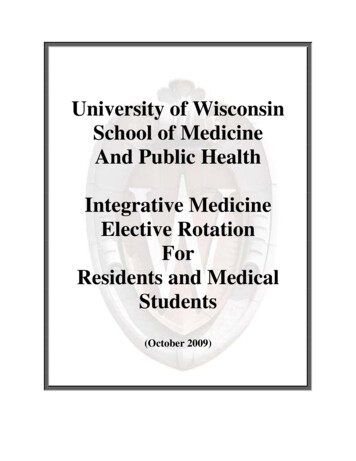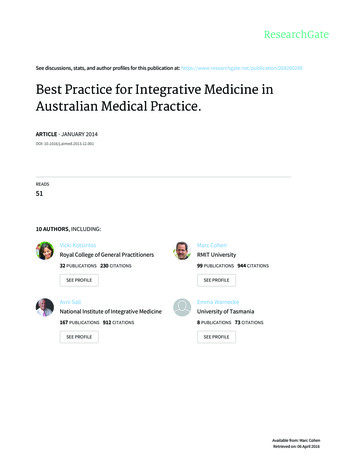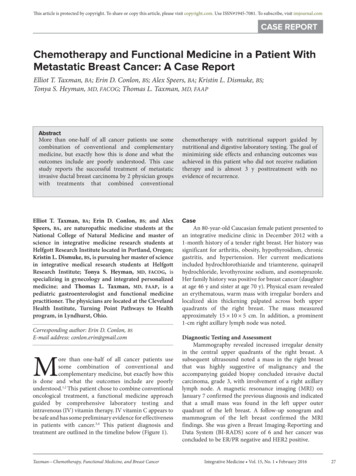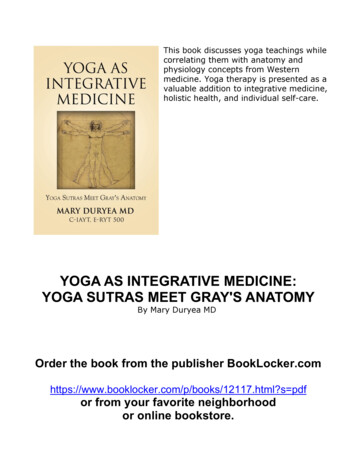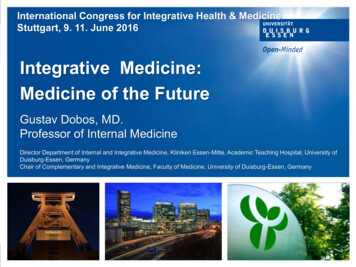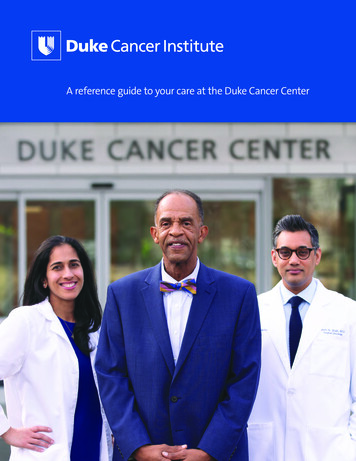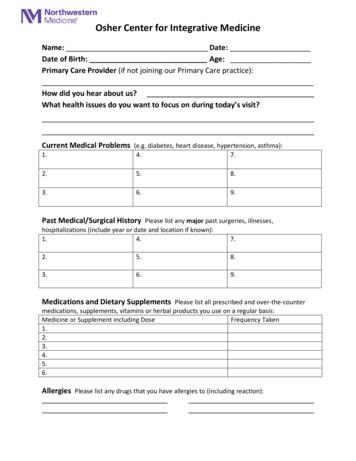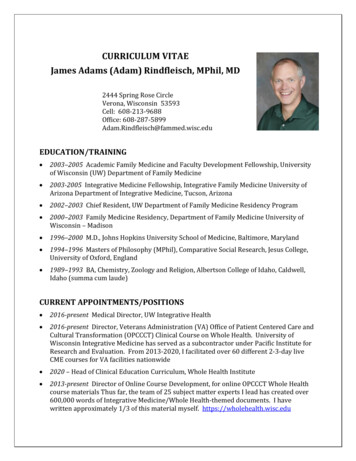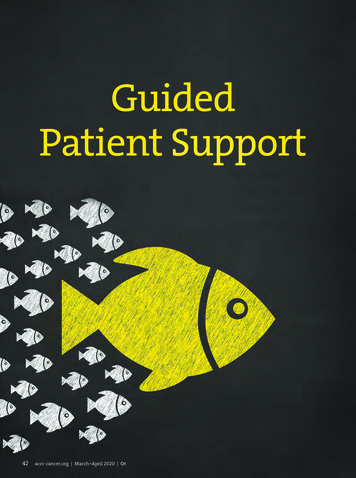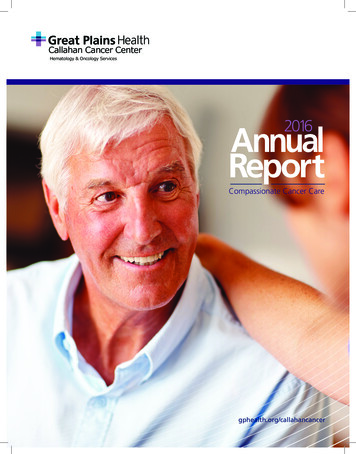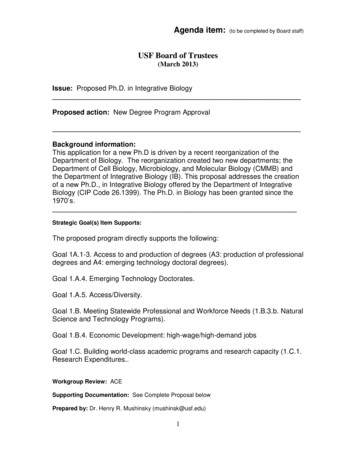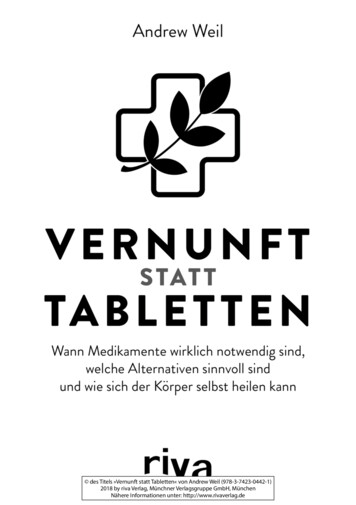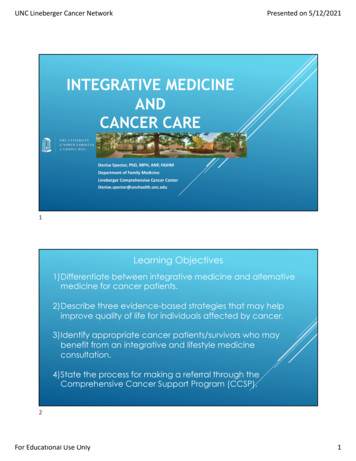
Transcription
UNC Lineberger Cancer NetworkPresented on 5/12/2021INTEGRATIVE MEDICINEANDCANCER CAREDenise Spector, PhD, MPH, ANP, FAIHMDepartment of Family MedicineLineberger Comprehensive Cancer CenterDenise.spector@unchealth.unc.edu1Learning Objectives1)Differentiate between integrative medicine and alternativemedicine for cancer patients.2)Describe three evidence-based strategies that may helpimprove quality of life for individuals affected by cancer.3)Identify appropriate cancer patients/survivors who maybenefit from an integrative and lifestyle medicineconsultation.4)State the process for making a referral through theComprehensive Cancer Support Program (CCSP).2For Educational Use Only1
UNC Lineberger Cancer NetworkPresented on 5/12/2021What is the differencebetween integrativemedicine for oncologypatients and alternativemedicine?3CAM AND INTEGRATIVE MEDICINEDEFINEDComplementary andAlternative Medicine“Complementary” practicestypically refer to the use of nonmainstream approaches alongwith conventional medicalapproaches.versus“Alternative” practices whichusually refers to using nonmainstream medicalapproaches instead ofconventional medicine.Source: National Center forComplementary and AlternativeMedicineIntegrative Medicine“A healing-oriented practicethat takes account of the wholeperson, including all aspects oflifestyle. It emphasizes thetherapeutic relationship betweenpractitioner and patient, isinformed by evidence, andmakes use of all appropriatetherapies.”Source: Arizona Center forIntegrative ut/definition.htmlhttp://nccam.nih.gov/health4For Educational Use Only2
UNC Lineberger Cancer NetworkPresented on 5/12/2021INTEGRATIVE ONCOLOGY DEFINED“Integrative oncology is a patient-centered,evidence-informed field of cancer care that utilizesmind and body practices, natural products, and/orlifestyle modifications from different traditionsalongside conventional cancer treatments.Integrative oncology aims to optimize health,quality of life, and clinical outcomes across thecancer care continuum and to empower peopleto prevent cancer and become active participantsbefore, during, and beyond cancer treatment.”Society of Integrative Oncology (2017)5CANCER SURVIVORSAND CAM USEØStudies vary widely in reports of CAM use amongcancer survivors. One study reported up to 91% usedat least one modality during treatment. Anotherreported up to 75% among those who were posttreatment.ØMost studies have been among individuals with breastand prostate cancers.ØApproximately 30% of patients don’t share their use ofCAM with their providers.ØCharacteristics of individuals most frequently reportinguse of CAM: females, younger vs. older adults,individuals with higher income and higher education.6For Educational Use Only3
UNC Lineberger Cancer NetworkPresented on 5/12/2021COMMON REASONS FOR CAM USEAMONG CANCER SURVIVORS1. Toimprove general well-being2. Totreat side effects of the cancer or cancertreatments3. Preventrecurrence or spread of cancer4. Increase5. Preventthe body’s ability to fight cancerother non-cancer diseases7 Acupuncture EnergyModalities Mind-Body Therapies Movement Therapies Nutrition and Supplements SpiritualityINTEGRATIVE MEDICINE APPROACHES8For Educational Use Only4
UNC Lineberger Cancer NetworkPresented on 5/12/2021ACUPUNCTUREReview of the evidence forcancer symptom management Statistically significant findings forreduced cancer-related pain, fatigue,as well as nausea and vomiting.Improvements also found for quality oflife (Lau et al., 2015). Therapeutic effects for cancer-relatedfatigue, nausea/vomiting and onleukopenia. Some evidence for hotflashes, quality of life, and hiccups (Wuet al., 2015). Menopausal symptoms significantlydecreased in breast cancer patients, butno reduction in hot flashes (Chien et al.,2017).910For Educational Use Only5
UNC Lineberger Cancer NetworkPresented on 5/12/2021ACUPUNCTURE AT UNCTwo Medical Acupuncturists:1)Wunian Chen, MD – Appointments can be madethrough the UNC Family Medicine Department at 984974-0210.2)Paul Thananopavarn, MD – Appointments can bemade through the UNC Department of PhysicalMedicine and Rehabilitation at 984-974-9747.Cost: 105 first visit and 80 for return visitsSome insurance companies may reimburse. Health care spendingaccounts available through some employers can be used to cover someof the costs.11 Reiki – Originated in Japan in the early1900s. Purpose is to ‘increase health byaccessing universal life energy thatconnects with an individual’s own healingabilities’. Qigong – A 2,000 year old Chinese mindbody exercise. Qi means breathing andvital energy and Gong means power. Italso involves the transfer of Qi energy fromone person to another. Therapeutic Touch – Co-developed in the1970s by an American nurse. Utilizesnontouch energy transfer to restorebalance and healing capacity.ENERGY THERAPIES12For Educational Use Only6
UNC Lineberger Cancer NetworkPresented on 5/12/2021REIKI THERAPYStudy Results Fleisheret al., (2014) found thatamong 213 cancer patientsreceiving Reiki, there was agreater than 50% reduction in selfreported distress, anxiety,depression, pain, and fatigue. AnRCT of 110 presurgical breastcancer patients found a decreasein anxiety and improvements inmood in the Reiki group (Chirico etal., 2017).1314For Educational Use Only7
UNC Lineberger Cancer NetworkPresented on 5/12/2021STRESS AND CANCER Both positive and negative thoughtsaffect our health. Chronic stress is associated withworse cancer outcomes. Approximately 10-15% of cancersurvivors suffer from some type ofclinical mood disorder such asdepression and/or anxiety during orfollowing treatment. Addressing stress through mentalhealth counseling, meditation,and/or exercise such as yoga couldbe vital to well-being and longevity.15MIND-BODY THERAPIES Guided Imagery – the use of a mental picture,thought or feeling of some desired outcome or of aplace that typically provides a sense of calm andrelaxation. Hypnosis –mental imagery and suggestive words areused to help create a state of deep relaxation. Meditation – involves very focused concentration onan image, a word, the breath, or an external objectto distract the mind leading to a relaxed state. Relaxation/breathing Techniques – the use ofabdominal breathing, muscle relaxation, and simpleimagery.16For Educational Use Only8
UNC Lineberger Cancer NetworkPresented on 5/12/2021In a systematic review and metaanalysis by Hall et al. (2018),19studies, which were focused on fearof recurrence, found that manydifferent forms of mind-bodyinterventions significantly reduceddistress among a wide range ofcancer patient populations.17THE POWER OF IMAGERY AND INDIVIDUALIZING THE SCENE18For Educational Use Only9
UNC Lineberger Cancer NetworkPresented on 5/12/202119MIND-BODYTHERAPIES – FIVEKEY ASPECTS OFCARE WHEN USE OFTHESE THERAPIESMAY BE BENEFICIAL1.Following a cancerdiagnosis, which is atime that often leadsto high emotionaldistress.2.Coping with andreduction oftreatment-related sideeffects.3.Aid in the stimulationof immunity and otherhealing responses.4.Reduction of cancerrelated pain.5.May influence theoutcome of disease.20For Educational Use Only10
UNC Lineberger Cancer NetworkPresented on 5/12/2021 .MIND-BODY THERAPIESMindfulness-BasedStress Reduction 2019 meta-analysis of 14 studies inbreast cancer patients - Results:reduced anxiety, depression, stress,fatigue and improved cognitivefunction. 2017 review of 6 studies of mixedcancer types – Results: MBSR mayhave some effect on biomarkers ofimproved immune functionrecovery (decreased IL-6 andtumor necrosis factor [TNF]). 2014 study in breast cancer patients- Results: increase in telomeraseactivity (marker of cellular agingand psychological stress) followinga 6-weel MBSR intervention.2122For Educational Use Only11
UNC Lineberger Cancer NetworkPresented on 5/12/2021MINDFUL MOMENTS THROUGH UNC’S CCSPCancer patients and survivors are provided individualized sessions to learn evidencebased mindfulness techniques (e.g., breathing practices, meditation, guided imagery) tohelp manage the symptoms of cancer and cancer treatment.Potential uses: Improve patients’ feelings of well-being and quality of life during and after treatmentDecrease depression and anxietyDecrease fatigue and increase energyImprove sleepProvide a mental vacationDecrease nausea and painAll sessions are provided virtually and are free of charge. To schedule, contact Carly Baileyat carly bailey@med.unc.edu23RESOURCESMindful MomentsUNC Integrative fulnessprogram/mindfulness-courseschedule/24For Educational Use Only12
UNC Lineberger Cancer NetworkPresented on 5/12/2021MOVEMENT THERAPIESØExercise – Review of 66 studies, conducted bothduring and post treatment Results: The majorityrevealed significant improvements incardiorespiratory function, body strength, bodyweight, functional quality of life, anxiety, mood, selfesteem, and on general symptoms and side effects,such as pain and lymphedema.ØResistance training – Review of 15 studies during andpost-treatment. Results: Large improvements werefound for muscular strength and endurance, physicalfunction, fatigue and on other quality of life measures;smaller improvements seen in body composition(decrease body fat, increase lean muscle mass).2526For Educational Use Only13
UNC Lineberger Cancer NetworkPresented on 5/12/2021NUTRITION AND CANCERFOOD AS MEDICINEThis Photo by Unknow n Author is licensed under C C BY-NC -NDØA predominantly plant-based dietas been associated with lowerrates of some cancers, such asbreast and endometrial cancers.ØOne study of a Mediterraneanstyle diet, high in fruits, vegetables,and whole grains, found a 40%reduction in the risk for a certaintype of breast cancer amongwomen who adhered to a Meddiet compared to those who didnot.Van den Brandt, et al. (2017). Mediterranean diet adherence andrisk of post menopausal breast cancer: results of a cohort studyand meta-analysis. International Journal of Cancer, 140, 22202231.2728For Educational Use Only14
UNC Lineberger Cancer NetworkPresented on 5/12/2021SupplementsMost national cancer organizations do notsupport the use of dietary supplements.Exceptions such as in cases of knowndeficiencies, such a low Vitamin D.In cases of nutritional deficiencies, canconsider the use of a high-quality multivitamin. Quality brands can be found on theconsumerlab.com website, which is a 3rdparty testing lab.Many herbs/supplements have potentialdrug/herb interactions with certain cancertreatments, it is safest to avoid them unlessadvised by a medical professional on theirsafe use.In some cases certain supplements may besuggested, such as Melatonin for sleep orAmerican Ginseng for fatigue, but should beconsidered after careful review of potentialinteractions with other therapies.29YOGA Arecent review (2021) of 7 studies focused onyoga in women with breast cancerundergoing chemotherapy foundimprovements in QoL, sleep, anxiety,depression and fatigue. Overallconclusion, studies suggest that yogacan be beneficial for fatigue and othersymptoms, but further research in needed withmore rigorous studies and in more diversesamples.30For Educational Use Only15
UNC Lineberger Cancer NetworkPresented on 5/12/2021YOGA An ancient Eastern spiritual practice that includesasanas (physical postures), pranayama(regulated breathing exercises) and meditationwith the goal of uniting mind, body and spirit forself-awareness and good health. Severaldifferent types exist. One of the most studiedCAM practices in oncology. Research on yoga and cancer suggests thatyoga has psychological and physical benefits,including: Improving patients’ feelings of well-being andquality of life during and after treatmentDecreasing depression and anxietyDecreasing fatigue and increasing energyDecreasing nausea and painMay enhance immune function. Most practices involve three basic components:asanas (physical poses), pranayama (breathcontrol), and dhyana (meditation).31YOGA THROUGH UNC CCSPInpatient Yoga TherapyGoal: Provide individualized yoga therapy to hospitalized patients to support their physical, emotional,and mental health by reducing cancer and treatment-related side-effects.The therapist will work with patients using the range of yoga’s tools, including movement/postures,meditation, visualization, relaxation, and breathing techniques. Instruction will be provided in the patient’sroom, unless otherwise requested, and can include standing, seated, or bedside activities.Outpatient Yoga ProgramGoal: Provide virtual group classes to patients and caregivers to support their physical, emotional, andmental health.Please contact Carly Bailey at carly bailey@med.unc.edu to gain access. Sessions are held over Zoomvideo Monday-Friday for a small fee.32For Educational Use Only16
UNC Lineberger Cancer NetworkPresented on 5/12/2021MOVEMENT THERAPIES CONT.Ancient Healing ArtsTaiji Diagram Qigong – An ancient Chinese healing art form that integratesmeditation, controlled breathing,and gentle movements. Thegentle, rhythmic movements ofQigong reduce stress, buildstamina, increase vitality, andenhance the immune system. Ithas also been found to improvecardiovascular, respiratory,circulatory, lymphatic anddigestive functions.Yang - YinWhite - BlackExhale - InhaleRelease - StoreExpand - ContractGive – ReceiveOffense – Defense Tai Chi – A form of Qigong that ischaracterized by slow circularmovements and stretches with afocus on balance. Began as anancient martial art form, but nowoften used to generate health,longevity, and internal strength.33SPIRITUALITY Spirituality has been defined ina many ways and is generallyrelated to religion, but is muchbroader than religiosity. Described as “a quality thatgoes beyond religious affiliationand that strives for inspiration,reverence, awe, meaning andpurpose, even in those whodon’t believe in God”. Others have described it as “apower, force, or energy thatstimulates creativity,motivation, or a striving forinspiration”. Simply put by Pargament(1997), spirituality is the “searchfor the sacred”.34For Educational Use Only17
UNC Lineberger Cancer NetworkPresented on 5/12/2021SPIRITUALITYCommon Practices:v Prayerv Meditationv Journalingv Labyrinthv Interactingv Musicwalkingwith natureand art35Spirituality and Health Outcomes While there may not be any scientific evidence that religion orspirituality impacts cancer progression or remission it has beenshown to significantly improve adjustment to a cancer diagnosis,symptoms related to the disease and/or treatment, and tooverall quality of life. Interestingly, one large review of 29 studies did reveal thatindividuals with cancer who scored higher on measures ofspiritual/religious involvement compared to those with lowerscores had higher odds of surviving their cancer.36For Educational Use Only18
UNC Lineberger Cancer NetworkPresented on 5/12/2021INTEGRATIVE AND LIFESTYLE MEDICINECONSULTATIONS AT LINEBERGER COMPREHENSIVECANCER CENTERThe Integrative and Lifestyle Medicine consult service helpsindividuals affected by cancer understand how complementarytherapies, such as mind-body practices, dietary and naturalsupplements, and lifestyle changes may decrease side effects ofconventional cancer treatments, as well as enhance quality of lifeand overall well-being during and beyond cancer treatment.37The individualized approach to caretakes into consideration physical,emotional/mental, social, spiritualand environmental influences thataffect a person’s health.Ø Education offered on strategiesthat may reduce risk forrecurrence, the development ofnew cancers or other chronicillnesses.ØINTEGRATIVE AND LIFESTYLECONSULTATIONS38For Educational Use Only19
UNC Lineberger Cancer NetworkPresented on 5/12/2021ØConsultation visits are available for anyoneaffected by cancer (i.e., prior to treatments,during active treatments and/or followingtreatments).ØConsultative visits are typically one hour andare covered by insurance as a medical visit.ØFor appointments, providers and patients cancontact Robin Haring 919 966 3494.39“The health of my body,mind, and spirit are related and whomever cares formy health should take thatinto account.”Eisenberg DM, et al. Ann Intern Med,2001;135:344-351; Astin JA, JAMA,1998;279(19):1548-155340For Educational Use Only20
UNC Lineberger Cancer NetworkPresented on 5/12/2021CASE STUDY – KM45 YEAR OLD NEWLY DIAGNOSED WITHEARLY STAGE WITH BREAST CANCER41vKM underwent bilateral mastectomy, radiation therapy andcombination chemotherapy. Was in the process of havingreconstructive surgery and was taking hormonal therapy when wemet.vAdditional medical history includes anxiety, depression, migrainesand she was overweight.vMarried, husband with Stage IV cancer; Two children 12 and 15years of age; financial and marital stress.vRequested referral for symptom management and overall healthand wellness.vPresented with several symptoms, such as fatigue, bone and jointpain, hot flashes, insomnia, weight gain, depression, cognitivechanges, constipation, neuropathy, etc.42For Educational Use Only21
UNC Lineberger Cancer NetworkPresented on 5/12/2021Recommendations:1) A anti-inflammatory/Mediterranean Diet diet, with the addition of 1-2 tablespoons of groundflax/day. Recommended obtaining a Vitamin D level with next blood draw and if lowsupplement as appropriate.2) In addition to a healthy diet encouraged regular exercise. Referral to Get REAL and HEELexercise program at UNC.3) Recommended yoga program through CCSP for stress management/mood/sleep, etc. Alsorecommended the use of aromatherapy with lavender essential oil for relaxation.4) Referral for acupuncture for neuropathy.5) Acupuncture for sleep, as well as stress reducing herbal teas, and Melatonin.6) Continued counseling through CCSP for depression. Recommended counseling for family aswell. Consider an in-person or online breast cancer support group. Additional suggestionswere guided imagery, etc. For spiritual health – journaling, especially a gratitude journal,meditation, prayer.43CASE STUDY – RT72 YEAR OLD RECENTLY DIAGNOSED WITHMETASTATIC RENAL CELL CARCINOMA44For Educational Use Only22
UNC Lineberger Cancer NetworkPresented on 5/12/2021ØRT on a randomized clinical trial (RCT) with twomonoclonal antibodies.ØRequested a consult to discuss how he could improve hisoverall health and well-being through diet and supplements.ØThrough the assessment it was also discoveredthat he was experiencing significant sleep disruption,as well as stress/anxiety around new diagnosis.45Recommendations:1) A predominantly plant-based, anti-inflammatory diet, as opposed to some of thedietary supplements. Okay to drink 1-2 cups of green tea/day.2) Continue with multivitamin, but avoid use of other high dose supplements as theyhad the potential to interact with his treatment, which could cause an increase indrug levels. Recommended obtaining a Vitamin D level with next blood draw.3) Regular exercise routine with progressive walking and some strengthening exercises2-3 times/week to help prevent/reduce treatment-related fatigue.4) Time-released Melatonin for sleep to help with early awakening, as well as other sleephygiene strategies.5) Counseling through CCSP for anxiety around new diagnosis and treatment.6) Mindful Moments to learn stress management techniques.46For Educational Use Only23
UNC Lineberger Cancer NetworkAmerican Cancer Society – Stay d on 5/12/2021ResourcesAmerican Institute for Cancer Research (AICR)http://www.aicr.orgLIVESTRONG MYPLATE Calorie Trackerhttp://www.livestrong.com/myplateMemorial Sloan Kettering Cancer Center: Herbs & ine/herbsNational Center for Complementary and Integrative Healthhttps://www.nccih.nih.gov/Natural Medicines Database – subscription ch.com/Society for Integrative Oncology – membership TIONS48For Educational Use Only24
UNC Lineberger Cancer NetworkPresented on 5/12/2021REFERENCESChien, T., Hsu, C., Liu, C., et al. (2017). Effect of acupuncture on hot flush and menopause symptoms in breast cancer: A systematic review and meta-analysis.PloS One, 12, doi:10.1371/journal.pone.0180918Chirico, A., D’Aiuto, G., Penon, A,, et al. (2017). Self-efficacy for coping with cancer enhances the effect of Reiki treatments during the pre-surgery phase ofbreast cancer patients. Anticancer Research, 37, 3657-3665. https://doi.org/10.21873/anticanres.11736Fleisher, K. A., Mackenzie, E. R., Frankel, E. S., et al. (2014). Integrative Reiki for cancer patients: A program evaluation. Integrative Cancer Therapies, 13, , D. L., Luberto, C. M., Philpotts, L. L., Song, R., Park, E. R., & Yeh, G. Y. (2018). Mind-body interventions for fear of cancer recurrence: A systematic reviewand meta-analysis. Psychooncology, 27(11), 2546–2558. doi:10.1002/pon.4757Lengacher, C. A., Reich, R. R., Kip, K. E. (2014). Influence of mindfulness-based stress reduction (MBSR) on telomerase activity in women with breast cancer(BC). Biological Research for Nursing, 16, 438-447. doi:10.1177/1099800413519495Lau, C. H. Y., Wu, X., Chung, V. C. H., et al. (2015). Acupuncture and related therapies for symptom management in palliative cancer care: Systematic reviewand meta-analysis. Medicine, 95, 2901.McTiernan, A., Friedenreich, C. M., Katzmarzyk, P. T., et al. (2018). Physical activity in cancer prevention and survival: A systematic review. Medicine andScience in Sports and Exercise, 51(6),1252–1261. doi:10.1249/MSS.0000000000001937Sanada, K., Diez M. A., Valero, M. S., et al. (2017). Effects of mindfulness-based interventions on biomarkers in health and cancer populations: A systematicreview. BMC Complementary and Alternative Medicine, 17, 125. doi:10.1186/s12906-017-1638-yWayne, P. M., Lee, M. S., Novakowski, J., et al., (2018). Tai Chi and Qigong for cancer-related symptoms and quality of life: A systematic review and metaanalysis, Journal of Cancer Survivorship,12(2), 256–267. doi:10.1007/s11764-017-0665-5Wu, X., Chung, V. C., Hui, E. P., et al. (2015). Effectiveness of acupuncture and related therapies for palliative care of cancer: Overview of systematic reviews.Scientific Reports, 5, doi: 10.1038/srep16776.Yi, L., Tian, X., Jin, Y., et al. (2021). Effects of yoga on health-related quality, physical health and psychological health in women with breast cancer receivingchemotherapy: A systematic review and meta-analysis. Annals of Palliative Medicine, 10(2), 1961-1975. http://dx.doi.org/10.21037/apm-20-1484Zhang, Q., Zhao, H., & Zheng, Y. (2019). Effectiveness of mindfulness-based stress reduction (MBSR) on symptom variables and health-related quality of life inbreast cancer patients: A systematic review and meta-analysis. Supportive Care in Cancer, 27(3), 771-781. doi:10.1007/s00520-018-4570-x49For Educational Use Only25
May 12, 2021
